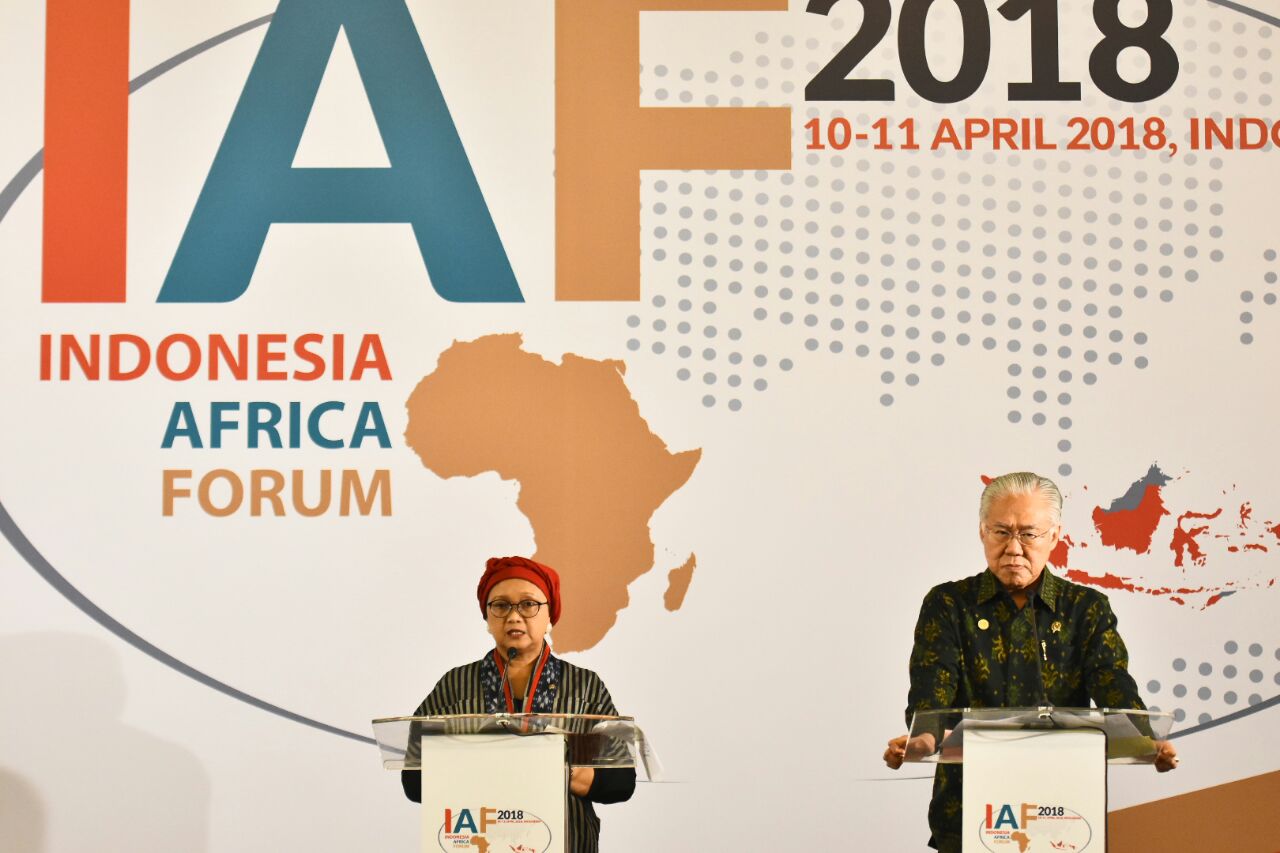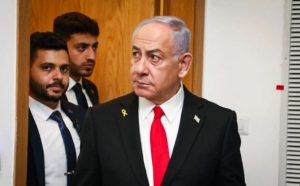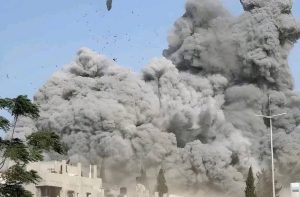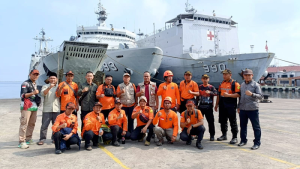Abuja,,MINA — Since the fall of the Suharto dictatorship in 1998, Indonesia has had an impressive rise in world politics. As the largest economy in Southeast Asia and the fourth largest population in the world, with more than 248 million people in 2012, the country had often made its voice heard, particularly on issues connected with the former
Third World, today known as the Global South. Indonesia has been a leading actor in the developing world since the 1955 conference of 29 nations of Asia and Africa, the first Asia-Africa Conference held in the city of Bandung. Indonesia’s growing presence will have implications for many countries nearby, including China, whose regional hegemony will surely be challenged.
The Indonesian government is seeking to bolster relations with Africa in order to effectively penetrate the African markets. Indonesia’s turn towards Africa is part of Jakarta’s assertive and pragmatic foreign policy, which since the early 2000s has been focusing on building a political and security community within the Association of Southeast Asian Nations (ASEAN) and also tightening links with the US, India, Australia, Russia, as well as other emerging countries,
Indonesia is also a member of the G20. Jakarta’s rising global profile is also evident in the new numeronyms and acronyms created in the last couple of years: PricewaterhouseCoopers, for instance, coined “E7,” representing the world’s seven major emerging countries: China, India, Brazil, Mexico, Russia, Indonesia and Turkey., Nigerian newspapepr Leadership reported Sunday.
Also Read: Sudan’s Army Seizes Several Areas in South Kordofan After Heavy Clashes with Paramilitary RSF
Goldman Sachs speaks of the “N-11” (Next Eleven), referring to Bangladesh, Egypt, Indonesia, Iran, Mexico, Nigeria, Pakistan, the Philippines, Turkey, South Korea and Vietnam, as the emerging countries with the potential to join the club of the largest economies over the course of the 21st century.
Smiles from African dlegates
Also Read: RSF Kills State News Agency’s Director in El-Fasher, Detains Several Journalists
In April this year, there were smiles from the African delegates gathered for the Indonesia-Africa Forum in Bali as Indonesian company executives signed a series of Africa-related business deals.
The agreements not only signalled Indonesian companies’ commitment to Africa’s economic growth, but also showed that the country was serious about increasing its influence on the continent. The business deals signed were worth $586.56 million and included one worth $26.7 million by state-owned contractor Wijaya Karya in Niger.
Future potential business deals worth a total of $1.3 billion were also announced, including one in Zambia by Inka, the state-owned train manufacturer, and one in Nigeria by state-run oil company Pertamina.
“[We] work together in advancing economic cooperation between Indonesia and Africa,” said Jusuf Kalla, Indonesia’s vice president, in his opening remarks on Tuesday for the two-day conference.
Also Read: UN Urges Urgent Action as Human Trafficking Fears Rise in RSF-Controlled Fasher
“The development of cooperation with Africa is a priority of Indonesia’s foreign policy.” Luhut Pandjaitan, Indonesia’s coordinating minister for maritime affairs, said that the Jakarta government was planning a task force to export Indonesian infrastructure to Africa “in the near future.”
Jakarta’s Africa push is a welcome development for Indonesian companies, as seen in the optimism among the executives attending the event. “Africa’s growth potential is huge,” said Iwan Joeniarto, president of GMF AeroAsia, the maintenance unit of the country’s flag carrier Garuda Indonesia
“Several African airlines are experiencing 100% growth, so for us, the market is highly interesting.” GMF already has deals with airlines in countries including Kenya and Djibouti, and Joeniarto said he had signed a maintenance deal with Nigeria’s Max Air as well as Ethiopia’s Ethiopia Airlines worth $3.17 million.
Prasetyadi, operations and information systems director at state-owned port operator Pelindo, echoed Joeniarto’s enthusiasm. “Africa is really attractive, really growing,” he said. “Therefore, we want to enter the market within this year.”
Also Read: Sudanese Army Battles RSF in Kordofan as Civilian Hardship Worsens
Former Indonesian President Sukarno was instrumental in forming the Asian-Africa Conference, also known as the Bandung Conference, in 1955 as nations from both areas looked to form a block that was separate from any involving the US or the then Soviet Union.
The archipelago nation has lacked any significant diplomatic achievements since then, and the current government, led by President Joko Widodo, is looking to leverage the deals forged by the state-owned enterprises to increase the country’s influence in the continent as well as in the international community.
Indonesia is pushing to become a non-permanent member of the United Nations Security Council, and any backing from African nations will help its case.
Indonesia is pushing to become a non-permanent member of the United Nations Security Council, and any backing from African nations will help its case. Widodo has also set a goal for Indonesia to become one of the 10 biggest economies in the world by 2030. Tapping into the growing African market is seen a fast track to achieving that target. It has been reported that Widodo-led government seeks market diversification, and is targeting several African countries with “non-oil-and-gas products.”
Also Read: UN Warns of Rapidly Worsening Humanitarian Crisis as Over 100,000 Flee Violence in Sudan
According to Statistics Indonesia (BPS), current major African trading partners for Indonesia are South Africa, Nigeria, Egypt, Algeria and Tanzania, Madagascar, Kenya, Benin, Angola and Ghana. Pundits believe that beyond bilateral agreements, a regional approach can be detected in Indonesia’s actions. Apart from the Southern African Development Community (SADC) and the East African Community (EAC), the Economic Community of West African States (ECOWAS) offers abundant opportunities to boost trade with Africa.
Stronger cooperation with Africa gives Indonesia a greater role
Some foreign affairs analysts have said that there have been some recent developments which can support these efforts. The establishment of the Joint Commission of Bilateral Cooperation (JCBC) between the government of the Republic of Indonesia and the Republic of The Gambia is a good example in this respect.
Also Read: 1,700 Sudanese Children Suffering From Malnutrition in Tawila Camp, Local Group Warns
Also, the government of Indonesia has been donating hand tractors to the governments of Senegal and The Gambia to support the mechanization of agricultural sectors in these countries.
The same developments are now being processed as well with other West African countries.” Stronger cooperation with Africa would give Indonesia a greater role, not only on the African continent but in the rapidly changing context of Afro-Asian relations
Seeking ways to boost trade, assisting African countries in different forms along the lines of the “Bandung solidarity,” and pursuing a pragmatic foreign policy under a new president could all result in an even more powerful and assertive Indonesia, one that may even warrant inclusion in the BRICS, perhaps as a replacement for Russia in a new BIICS group. .(T/RS5/RS1)
Mi’rsj Iislamic News Agency (MINA)
Also Read: South Africa Probes ‘Mysterious’ Charter Flight Bringing 153 Palestinian





















 Mina Indonesia
Mina Indonesia Mina Arabic
Mina Arabic